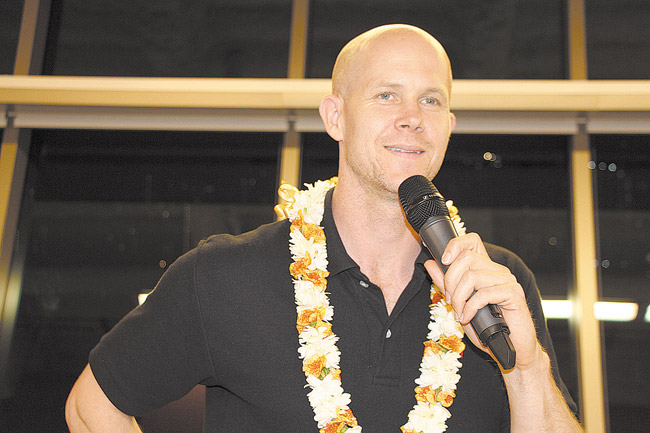Top Tips From ‘The Pitch Doctor’

Tyler Crowley was the guest speaker at an event hosted by the Honolulu chapter of Founder Institute | Christina O’Connor photo
During a presentation hosted by the local chapter of Founder Institute, a startup school and launch program, earlier this month at Iolani School’s Sullivan Center, guest speaker Tyler Crowley demonstrated an odd paradox of the human memory.
Crowley, a California-based entrepreneur, asked the 40 or so members of the audience – comprised largely of local business owners and aspiring entrepreneurs – if they could recall a brief scene from the 1986 movie Top Gun. He wanted to know if they could remember how Tom Cruise’s character got to his girlfriend’s house from the military base.
Most of the audience raised their hands. Sure, they remembered. He rode a motorcycle.
“This is strange that people remember this fact,” Crowley told them. “Why? Because this is 27 seconds from a movie 27 years ago. This is a tiny piece of the movie … Your brain should have forgotten this fact a long time ago. But it didn’t.”
That so many people remembered this scene is particularly strange considering that minutes before, Crowley asked the audience to recall the names of the three businesses their fellow entrepreneurs in the room had presented just 10 minutes earlier. Not many could.
The reason for this disparity, Crowley explains, is because our brains are particularly adept at remembering stories – a fact that should be incorporated into creating a business pitch.
Crowley founded Skweal, a website that allows customers to give feedback directly and privately to retailers. Prior to that, he had founded a human-powered search engine. In his own business experience and from serving as producer of the Launch Conference, Crowley has found that having a perfected pitch is fundamental to any startup.
“At some point, you are going to have to have customers or investors or partners or employees, and in each case, you are going to need to convince them effectively to get on board with your vision,” he says. “That is really what pitching is about: communicating your vision in a way that touches people and resonates with them so that they want to get involved.”
Known as “The Pitch Doctor,” Crowley has coached thousands of individuals and businesses to develop their pitches. Here’s some of the advice he shared at the event:
1) It is about the audience; it’s not about you.
Crowley explains that when most people are writing their presentations, they are asking themselves, “What do I want to say?” Instead, you should be asking what do you want the audience to hear, what do you want the audience to think, what do you want the audience to feel?
“Focus more on your audience than on yourself,” he says.
2) Start with the end. “Be very, very, very clear in your own mind, ‘What is the one thing I want them to remember?'” he says.
Crowley explains that this point is based on the limitations of people’s memories. The audience is not likely to remember the name of your company or other specific details, but they will remember one big takeaway. Think about the end goal of your presentation and tailor your pitch around that goal.
“They are only going to remember the core of what you do,” Crowley says.
“That being the case,” he adds, “you have to really focus on the message you want to communicate very clearly.”
3) Make your pitch memorable and likable.
This is the crux of Crowley’s pitch advice: In order to make sure people remember your pitch, structure it like a story. That means you need characters and you need drama. Introduce these elements early on.
“At that moment, you’re hooked,” he explains. “You need to know what is going to happen at the end.”
Hook your audience in the first 90 seconds or you risk losing them.
4) The “Wow” Moment This is like the climax of your story – when the character discovers your product and what it can do to help solve their problem.
Have the character use the product, and that leads to …
5) The Happy Ending After your character faces a challenge, the product provides a solution.
“You need to resolve the drama you started at the beginning,” he says. “You want them to leave with the feeling that, wow, your character used your product and really benefitted.”
6) Know whom you are pitching
Try to find out what you can about your audience and incorporate some of their interests into your presentation.
“The more personal you can make it, the better,” he says.
coconnor@midweek.com





